Conveyancing Law & Practice: A Detailed Analysis of Section 32 Issues
VerifiedAdded on 2023/06/05
|8
|2967
|62
Report
AI Summary
This report provides a comprehensive overview of conveyancing law, focusing particularly on Section 32 of the Sale of Land Act, 1962, which mandates vendors to disclose crucial information to potential buyers before a property sale. The document elucidates the vendor's responsibilities regarding taxes, rates, charges, and outgoings, as well as the disclosure of mortgages and rent profits. It further examines the duties of a vendor's conveyancer in providing adjusted statements of account, detailing the distribution of water usage and council rates between the vendor and buyer. The report also discusses the implications of short sales and foreclosures, outlining the advantages and disadvantages for both the borrower (Isabelle) and the lending institution (Eastpac Bank). Additionally, it addresses restrictive covenants and the legal avenues available for their modification, such as applying for a planning permit or seeking recourse through the Supreme Court. The report also covers the roles of buyer’s advocates, conveyancers, legal practitioners and estate agents in property transactions. Finally, it emphasizes the rights of the buyer (Damion) to claim full compliance from the vendor regarding outgoing charges and the potential legal consequences for non-compliance, including criminal offenses and contract cancellation.
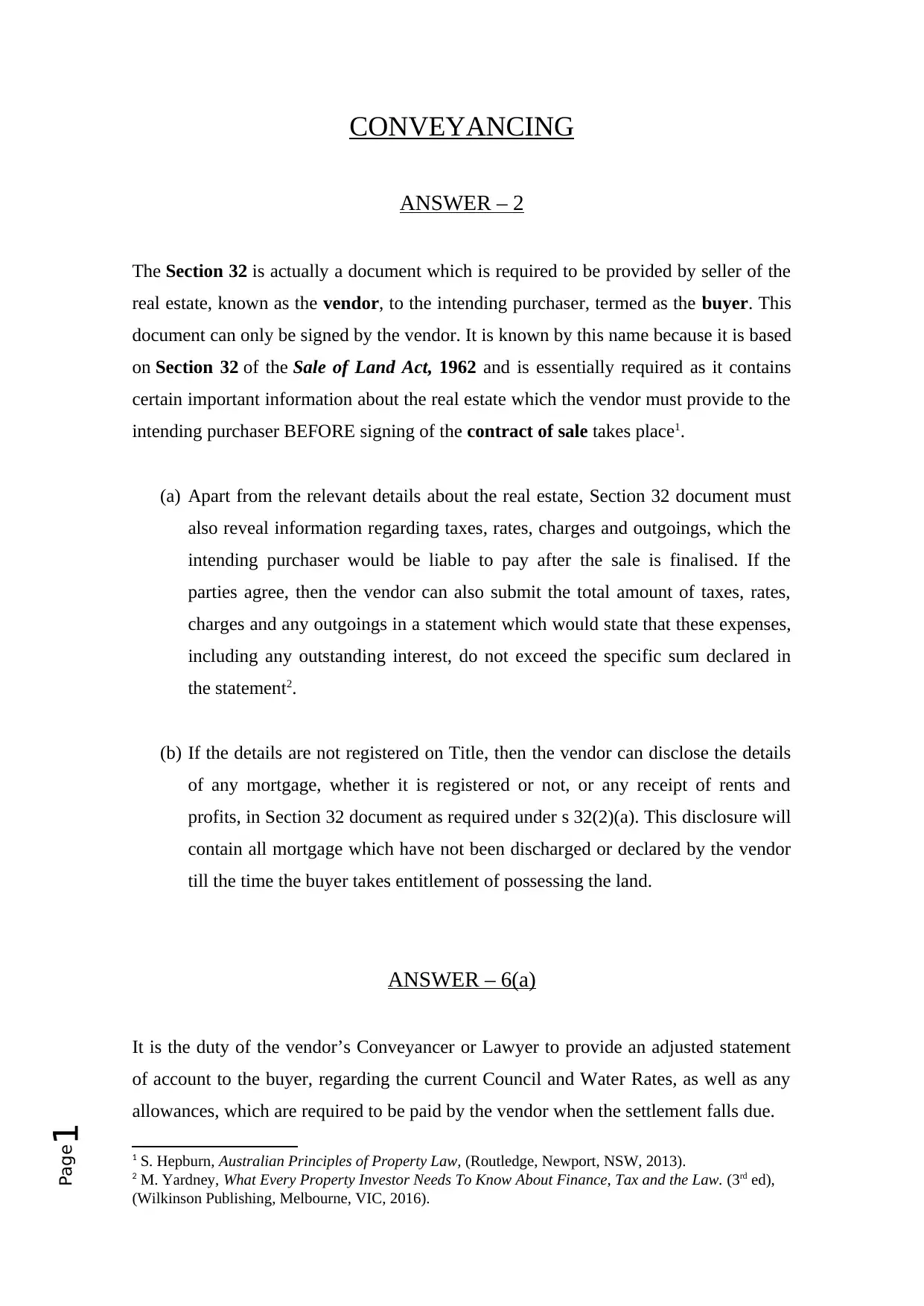
Page1
CONVEYANCING
ANSWER – 2
The Section 32 is actually a document which is required to be provided by seller of the
real estate, known as the vendor, to the intending purchaser, termed as the buyer. This
document can only be signed by the vendor. It is known by this name because it is based
on Section 32 of the Sale of Land Act, 1962 and is essentially required as it contains
certain important information about the real estate which the vendor must provide to the
intending purchaser BEFORE signing of the contract of sale takes place1.
(a) Apart from the relevant details about the real estate, Section 32 document must
also reveal information regarding taxes, rates, charges and outgoings, which the
intending purchaser would be liable to pay after the sale is finalised. If the
parties agree, then the vendor can also submit the total amount of taxes, rates,
charges and any outgoings in a statement which would state that these expenses,
including any outstanding interest, do not exceed the specific sum declared in
the statement2.
(b) If the details are not registered on Title, then the vendor can disclose the details
of any mortgage, whether it is registered or not, or any receipt of rents and
profits, in Section 32 document as required under s 32(2)(a). This disclosure will
contain all mortgage which have not been discharged or declared by the vendor
till the time the buyer takes entitlement of possessing the land.
ANSWER – 6(a)
It is the duty of the vendor’s Conveyancer or Lawyer to provide an adjusted statement
of account to the buyer, regarding the current Council and Water Rates, as well as any
allowances, which are required to be paid by the vendor when the settlement falls due.
1 S. Hepburn, Australian Principles of Property Law, (Routledge, Newport, NSW, 2013).
2 M. Yardney, What Every Property Investor Needs To Know About Finance, Tax and the Law. (3rd ed),
(Wilkinson Publishing, Melbourne, VIC, 2016).
CONVEYANCING
ANSWER – 2
The Section 32 is actually a document which is required to be provided by seller of the
real estate, known as the vendor, to the intending purchaser, termed as the buyer. This
document can only be signed by the vendor. It is known by this name because it is based
on Section 32 of the Sale of Land Act, 1962 and is essentially required as it contains
certain important information about the real estate which the vendor must provide to the
intending purchaser BEFORE signing of the contract of sale takes place1.
(a) Apart from the relevant details about the real estate, Section 32 document must
also reveal information regarding taxes, rates, charges and outgoings, which the
intending purchaser would be liable to pay after the sale is finalised. If the
parties agree, then the vendor can also submit the total amount of taxes, rates,
charges and any outgoings in a statement which would state that these expenses,
including any outstanding interest, do not exceed the specific sum declared in
the statement2.
(b) If the details are not registered on Title, then the vendor can disclose the details
of any mortgage, whether it is registered or not, or any receipt of rents and
profits, in Section 32 document as required under s 32(2)(a). This disclosure will
contain all mortgage which have not been discharged or declared by the vendor
till the time the buyer takes entitlement of possessing the land.
ANSWER – 6(a)
It is the duty of the vendor’s Conveyancer or Lawyer to provide an adjusted statement
of account to the buyer, regarding the current Council and Water Rates, as well as any
allowances, which are required to be paid by the vendor when the settlement falls due.
1 S. Hepburn, Australian Principles of Property Law, (Routledge, Newport, NSW, 2013).
2 M. Yardney, What Every Property Investor Needs To Know About Finance, Tax and the Law. (3rd ed),
(Wilkinson Publishing, Melbourne, VIC, 2016).
Paraphrase This Document
Need a fresh take? Get an instant paraphrase of this document with our AI Paraphraser
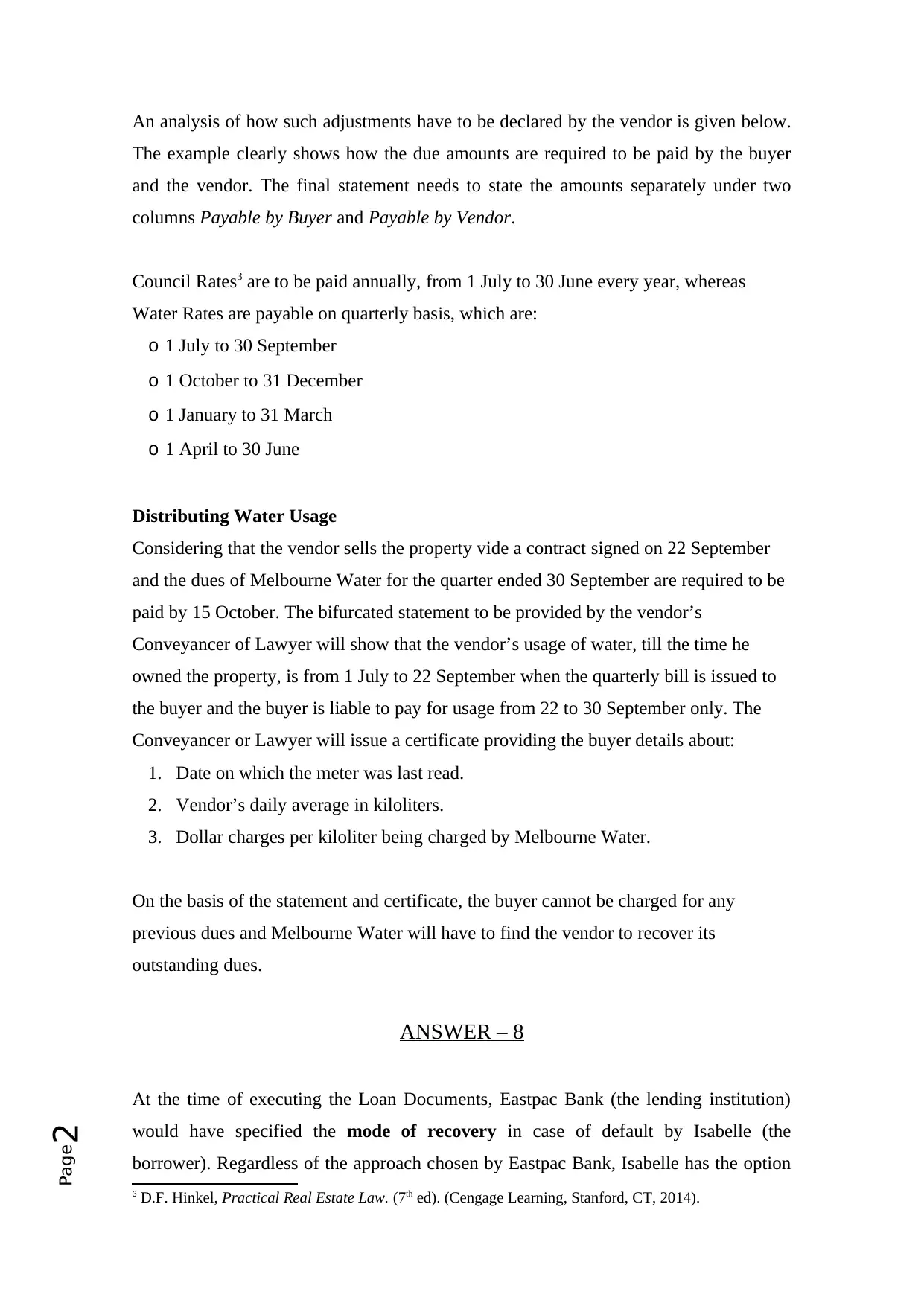
Page2
An analysis of how such adjustments have to be declared by the vendor is given below.
The example clearly shows how the due amounts are required to be paid by the buyer
and the vendor. The final statement needs to state the amounts separately under two
columns Payable by Buyer and Payable by Vendor.
Council Rates3 are to be paid annually, from 1 July to 30 June every year, whereas
Water Rates are payable on quarterly basis, which are:
o 1 July to 30 September
o 1 October to 31 December
o 1 January to 31 March
o 1 April to 30 June
Distributing Water Usage
Considering that the vendor sells the property vide a contract signed on 22 September
and the dues of Melbourne Water for the quarter ended 30 September are required to be
paid by 15 October. The bifurcated statement to be provided by the vendor’s
Conveyancer of Lawyer will show that the vendor’s usage of water, till the time he
owned the property, is from 1 July to 22 September when the quarterly bill is issued to
the buyer and the buyer is liable to pay for usage from 22 to 30 September only. The
Conveyancer or Lawyer will issue a certificate providing the buyer details about:
1. Date on which the meter was last read.
2. Vendor’s daily average in kiloliters.
3. Dollar charges per kiloliter being charged by Melbourne Water.
On the basis of the statement and certificate, the buyer cannot be charged for any
previous dues and Melbourne Water will have to find the vendor to recover its
outstanding dues.
ANSWER – 8
At the time of executing the Loan Documents, Eastpac Bank (the lending institution)
would have specified the mode of recovery in case of default by Isabelle (the
borrower). Regardless of the approach chosen by Eastpac Bank, Isabelle has the option
3 D.F. Hinkel, Practical Real Estate Law. (7th ed). (Cengage Learning, Stanford, CT, 2014).
An analysis of how such adjustments have to be declared by the vendor is given below.
The example clearly shows how the due amounts are required to be paid by the buyer
and the vendor. The final statement needs to state the amounts separately under two
columns Payable by Buyer and Payable by Vendor.
Council Rates3 are to be paid annually, from 1 July to 30 June every year, whereas
Water Rates are payable on quarterly basis, which are:
o 1 July to 30 September
o 1 October to 31 December
o 1 January to 31 March
o 1 April to 30 June
Distributing Water Usage
Considering that the vendor sells the property vide a contract signed on 22 September
and the dues of Melbourne Water for the quarter ended 30 September are required to be
paid by 15 October. The bifurcated statement to be provided by the vendor’s
Conveyancer of Lawyer will show that the vendor’s usage of water, till the time he
owned the property, is from 1 July to 22 September when the quarterly bill is issued to
the buyer and the buyer is liable to pay for usage from 22 to 30 September only. The
Conveyancer or Lawyer will issue a certificate providing the buyer details about:
1. Date on which the meter was last read.
2. Vendor’s daily average in kiloliters.
3. Dollar charges per kiloliter being charged by Melbourne Water.
On the basis of the statement and certificate, the buyer cannot be charged for any
previous dues and Melbourne Water will have to find the vendor to recover its
outstanding dues.
ANSWER – 8
At the time of executing the Loan Documents, Eastpac Bank (the lending institution)
would have specified the mode of recovery in case of default by Isabelle (the
borrower). Regardless of the approach chosen by Eastpac Bank, Isabelle has the option
3 D.F. Hinkel, Practical Real Estate Law. (7th ed). (Cengage Learning, Stanford, CT, 2014).
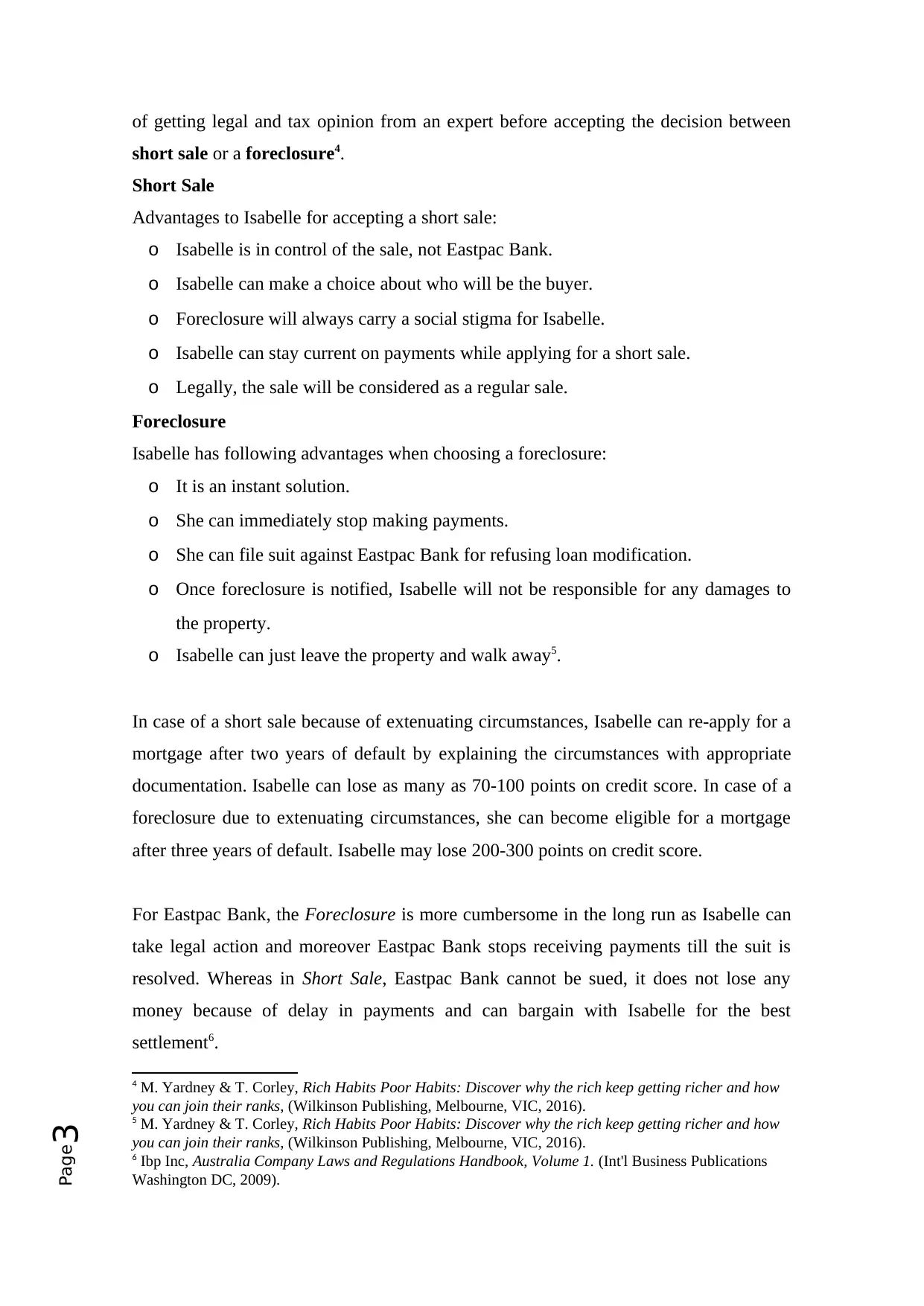
Page3
of getting legal and tax opinion from an expert before accepting the decision between
short sale or a foreclosure4.
Short Sale
Advantages to Isabelle for accepting a short sale:
o Isabelle is in control of the sale, not Eastpac Bank.
o Isabelle can make a choice about who will be the buyer.
o Foreclosure will always carry a social stigma for Isabelle.
o Isabelle can stay current on payments while applying for a short sale.
o Legally, the sale will be considered as a regular sale.
Foreclosure
Isabelle has following advantages when choosing a foreclosure:
o It is an instant solution.
o She can immediately stop making payments.
o She can file suit against Eastpac Bank for refusing loan modification.
o Once foreclosure is notified, Isabelle will not be responsible for any damages to
the property.
o Isabelle can just leave the property and walk away5.
In case of a short sale because of extenuating circumstances, Isabelle can re-apply for a
mortgage after two years of default by explaining the circumstances with appropriate
documentation. Isabelle can lose as many as 70-100 points on credit score. In case of a
foreclosure due to extenuating circumstances, she can become eligible for a mortgage
after three years of default. Isabelle may lose 200-300 points on credit score.
For Eastpac Bank, the Foreclosure is more cumbersome in the long run as Isabelle can
take legal action and moreover Eastpac Bank stops receiving payments till the suit is
resolved. Whereas in Short Sale, Eastpac Bank cannot be sued, it does not lose any
money because of delay in payments and can bargain with Isabelle for the best
settlement6.
4 M. Yardney & T. Corley, Rich Habits Poor Habits: Discover why the rich keep getting richer and how
you can join their ranks, (Wilkinson Publishing, Melbourne, VIC, 2016).
5 M. Yardney & T. Corley, Rich Habits Poor Habits: Discover why the rich keep getting richer and how
you can join their ranks, (Wilkinson Publishing, Melbourne, VIC, 2016).
6 Ibp Inc, Australia Company Laws and Regulations Handbook, Volume 1. (Int'l Business Publications
Washington DC, 2009).
of getting legal and tax opinion from an expert before accepting the decision between
short sale or a foreclosure4.
Short Sale
Advantages to Isabelle for accepting a short sale:
o Isabelle is in control of the sale, not Eastpac Bank.
o Isabelle can make a choice about who will be the buyer.
o Foreclosure will always carry a social stigma for Isabelle.
o Isabelle can stay current on payments while applying for a short sale.
o Legally, the sale will be considered as a regular sale.
Foreclosure
Isabelle has following advantages when choosing a foreclosure:
o It is an instant solution.
o She can immediately stop making payments.
o She can file suit against Eastpac Bank for refusing loan modification.
o Once foreclosure is notified, Isabelle will not be responsible for any damages to
the property.
o Isabelle can just leave the property and walk away5.
In case of a short sale because of extenuating circumstances, Isabelle can re-apply for a
mortgage after two years of default by explaining the circumstances with appropriate
documentation. Isabelle can lose as many as 70-100 points on credit score. In case of a
foreclosure due to extenuating circumstances, she can become eligible for a mortgage
after three years of default. Isabelle may lose 200-300 points on credit score.
For Eastpac Bank, the Foreclosure is more cumbersome in the long run as Isabelle can
take legal action and moreover Eastpac Bank stops receiving payments till the suit is
resolved. Whereas in Short Sale, Eastpac Bank cannot be sued, it does not lose any
money because of delay in payments and can bargain with Isabelle for the best
settlement6.
4 M. Yardney & T. Corley, Rich Habits Poor Habits: Discover why the rich keep getting richer and how
you can join their ranks, (Wilkinson Publishing, Melbourne, VIC, 2016).
5 M. Yardney & T. Corley, Rich Habits Poor Habits: Discover why the rich keep getting richer and how
you can join their ranks, (Wilkinson Publishing, Melbourne, VIC, 2016).
6 Ibp Inc, Australia Company Laws and Regulations Handbook, Volume 1. (Int'l Business Publications
Washington DC, 2009).
⊘ This is a preview!⊘
Do you want full access?
Subscribe today to unlock all pages.

Trusted by 1+ million students worldwide
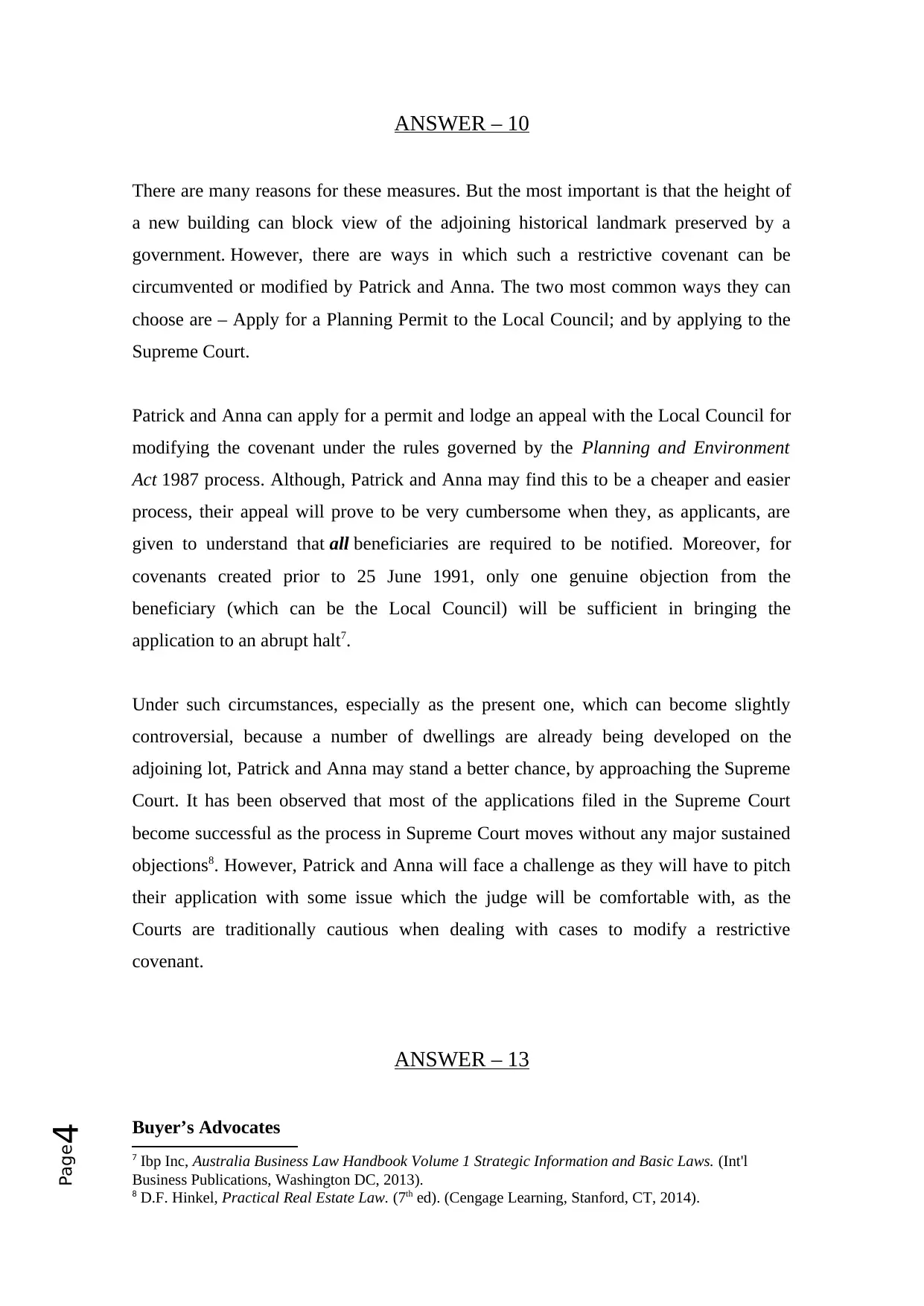
Page4
ANSWER – 10
There are many reasons for these measures. But the most important is that the height of
a new building can block view of the adjoining historical landmark preserved by a
government. However, there are ways in which such a restrictive covenant can be
circumvented or modified by Patrick and Anna. The two most common ways they can
choose are – Apply for a Planning Permit to the Local Council; and by applying to the
Supreme Court.
Patrick and Anna can apply for a permit and lodge an appeal with the Local Council for
modifying the covenant under the rules governed by the Planning and Environment
Act 1987 process. Although, Patrick and Anna may find this to be a cheaper and easier
process, their appeal will prove to be very cumbersome when they, as applicants, are
given to understand that all beneficiaries are required to be notified. Moreover, for
covenants created prior to 25 June 1991, only one genuine objection from the
beneficiary (which can be the Local Council) will be sufficient in bringing the
application to an abrupt halt7.
Under such circumstances, especially as the present one, which can become slightly
controversial, because a number of dwellings are already being developed on the
adjoining lot, Patrick and Anna may stand a better chance, by approaching the Supreme
Court. It has been observed that most of the applications filed in the Supreme Court
become successful as the process in Supreme Court moves without any major sustained
objections8. However, Patrick and Anna will face a challenge as they will have to pitch
their application with some issue which the judge will be comfortable with, as the
Courts are traditionally cautious when dealing with cases to modify a restrictive
covenant.
ANSWER – 13
Buyer’s Advocates
7 Ibp Inc, Australia Business Law Handbook Volume 1 Strategic Information and Basic Laws. (Int'l
Business Publications, Washington DC, 2013).
8 D.F. Hinkel, Practical Real Estate Law. (7th ed). (Cengage Learning, Stanford, CT, 2014).
ANSWER – 10
There are many reasons for these measures. But the most important is that the height of
a new building can block view of the adjoining historical landmark preserved by a
government. However, there are ways in which such a restrictive covenant can be
circumvented or modified by Patrick and Anna. The two most common ways they can
choose are – Apply for a Planning Permit to the Local Council; and by applying to the
Supreme Court.
Patrick and Anna can apply for a permit and lodge an appeal with the Local Council for
modifying the covenant under the rules governed by the Planning and Environment
Act 1987 process. Although, Patrick and Anna may find this to be a cheaper and easier
process, their appeal will prove to be very cumbersome when they, as applicants, are
given to understand that all beneficiaries are required to be notified. Moreover, for
covenants created prior to 25 June 1991, only one genuine objection from the
beneficiary (which can be the Local Council) will be sufficient in bringing the
application to an abrupt halt7.
Under such circumstances, especially as the present one, which can become slightly
controversial, because a number of dwellings are already being developed on the
adjoining lot, Patrick and Anna may stand a better chance, by approaching the Supreme
Court. It has been observed that most of the applications filed in the Supreme Court
become successful as the process in Supreme Court moves without any major sustained
objections8. However, Patrick and Anna will face a challenge as they will have to pitch
their application with some issue which the judge will be comfortable with, as the
Courts are traditionally cautious when dealing with cases to modify a restrictive
covenant.
ANSWER – 13
Buyer’s Advocates
7 Ibp Inc, Australia Business Law Handbook Volume 1 Strategic Information and Basic Laws. (Int'l
Business Publications, Washington DC, 2013).
8 D.F. Hinkel, Practical Real Estate Law. (7th ed). (Cengage Learning, Stanford, CT, 2014).
Paraphrase This Document
Need a fresh take? Get an instant paraphrase of this document with our AI Paraphraser
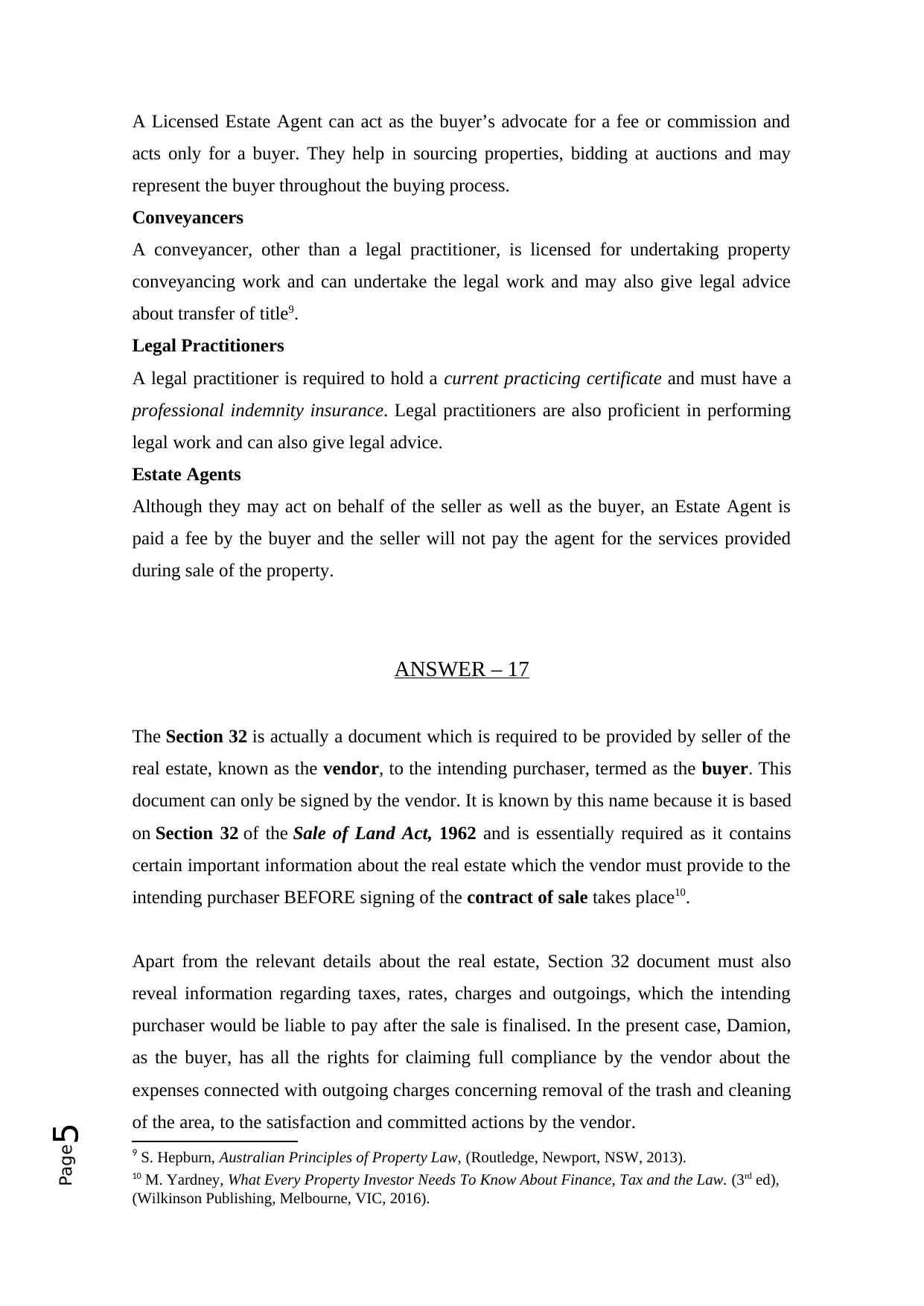
Page5
A Licensed Estate Agent can act as the buyer’s advocate for a fee or commission and
acts only for a buyer. They help in sourcing properties, bidding at auctions and may
represent the buyer throughout the buying process.
Conveyancers
A conveyancer, other than a legal practitioner, is licensed for undertaking property
conveyancing work and can undertake the legal work and may also give legal advice
about transfer of title9.
Legal Practitioners
A legal practitioner is required to hold a current practicing certificate and must have a
professional indemnity insurance. Legal practitioners are also proficient in performing
legal work and can also give legal advice.
Estate Agents
Although they may act on behalf of the seller as well as the buyer, an Estate Agent is
paid a fee by the buyer and the seller will not pay the agent for the services provided
during sale of the property.
ANSWER – 17
The Section 32 is actually a document which is required to be provided by seller of the
real estate, known as the vendor, to the intending purchaser, termed as the buyer. This
document can only be signed by the vendor. It is known by this name because it is based
on Section 32 of the Sale of Land Act, 1962 and is essentially required as it contains
certain important information about the real estate which the vendor must provide to the
intending purchaser BEFORE signing of the contract of sale takes place10.
Apart from the relevant details about the real estate, Section 32 document must also
reveal information regarding taxes, rates, charges and outgoings, which the intending
purchaser would be liable to pay after the sale is finalised. In the present case, Damion,
as the buyer, has all the rights for claiming full compliance by the vendor about the
expenses connected with outgoing charges concerning removal of the trash and cleaning
of the area, to the satisfaction and committed actions by the vendor.
9 S. Hepburn, Australian Principles of Property Law, (Routledge, Newport, NSW, 2013).
10 M. Yardney, What Every Property Investor Needs To Know About Finance, Tax and the Law. (3rd ed),
(Wilkinson Publishing, Melbourne, VIC, 2016).
A Licensed Estate Agent can act as the buyer’s advocate for a fee or commission and
acts only for a buyer. They help in sourcing properties, bidding at auctions and may
represent the buyer throughout the buying process.
Conveyancers
A conveyancer, other than a legal practitioner, is licensed for undertaking property
conveyancing work and can undertake the legal work and may also give legal advice
about transfer of title9.
Legal Practitioners
A legal practitioner is required to hold a current practicing certificate and must have a
professional indemnity insurance. Legal practitioners are also proficient in performing
legal work and can also give legal advice.
Estate Agents
Although they may act on behalf of the seller as well as the buyer, an Estate Agent is
paid a fee by the buyer and the seller will not pay the agent for the services provided
during sale of the property.
ANSWER – 17
The Section 32 is actually a document which is required to be provided by seller of the
real estate, known as the vendor, to the intending purchaser, termed as the buyer. This
document can only be signed by the vendor. It is known by this name because it is based
on Section 32 of the Sale of Land Act, 1962 and is essentially required as it contains
certain important information about the real estate which the vendor must provide to the
intending purchaser BEFORE signing of the contract of sale takes place10.
Apart from the relevant details about the real estate, Section 32 document must also
reveal information regarding taxes, rates, charges and outgoings, which the intending
purchaser would be liable to pay after the sale is finalised. In the present case, Damion,
as the buyer, has all the rights for claiming full compliance by the vendor about the
expenses connected with outgoing charges concerning removal of the trash and cleaning
of the area, to the satisfaction and committed actions by the vendor.
9 S. Hepburn, Australian Principles of Property Law, (Routledge, Newport, NSW, 2013).
10 M. Yardney, What Every Property Investor Needs To Know About Finance, Tax and the Law. (3rd ed),
(Wilkinson Publishing, Melbourne, VIC, 2016).
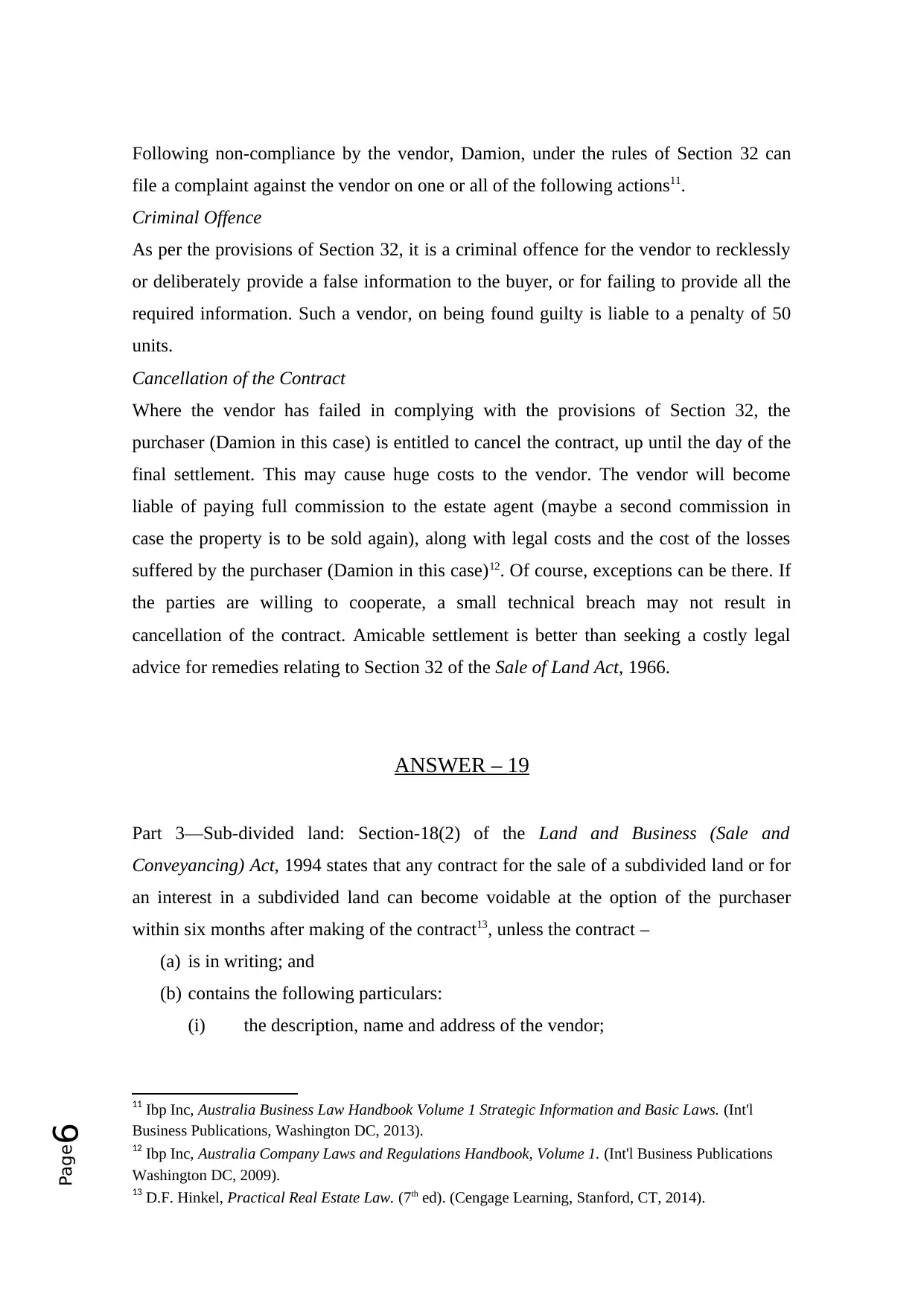
Page6
Following non-compliance by the vendor, Damion, under the rules of Section 32 can
file a complaint against the vendor on one or all of the following actions11.
Criminal Offence
As per the provisions of Section 32, it is a criminal offence for the vendor to recklessly
or deliberately provide a false information to the buyer, or for failing to provide all the
required information. Such a vendor, on being found guilty is liable to a penalty of 50
units.
Cancellation of the Contract
Where the vendor has failed in complying with the provisions of Section 32, the
purchaser (Damion in this case) is entitled to cancel the contract, up until the day of the
final settlement. This may cause huge costs to the vendor. The vendor will become
liable of paying full commission to the estate agent (maybe a second commission in
case the property is to be sold again), along with legal costs and the cost of the losses
suffered by the purchaser (Damion in this case)12. Of course, exceptions can be there. If
the parties are willing to cooperate, a small technical breach may not result in
cancellation of the contract. Amicable settlement is better than seeking a costly legal
advice for remedies relating to Section 32 of the Sale of Land Act, 1966.
ANSWER – 19
Part 3—Sub-divided land: Section-18(2) of the Land and Business (Sale and
Conveyancing) Act, 1994 states that any contract for the sale of a subdivided land or for
an interest in a subdivided land can become voidable at the option of the purchaser
within six months after making of the contract13, unless the contract –
(a) is in writing; and
(b) contains the following particulars:
(i) the description, name and address of the vendor;
11 Ibp Inc, Australia Business Law Handbook Volume 1 Strategic Information and Basic Laws. (Int'l
Business Publications, Washington DC, 2013).
12 Ibp Inc, Australia Company Laws and Regulations Handbook, Volume 1. (Int'l Business Publications
Washington DC, 2009).
13 D.F. Hinkel, Practical Real Estate Law. (7th ed). (Cengage Learning, Stanford, CT, 2014).
Following non-compliance by the vendor, Damion, under the rules of Section 32 can
file a complaint against the vendor on one or all of the following actions11.
Criminal Offence
As per the provisions of Section 32, it is a criminal offence for the vendor to recklessly
or deliberately provide a false information to the buyer, or for failing to provide all the
required information. Such a vendor, on being found guilty is liable to a penalty of 50
units.
Cancellation of the Contract
Where the vendor has failed in complying with the provisions of Section 32, the
purchaser (Damion in this case) is entitled to cancel the contract, up until the day of the
final settlement. This may cause huge costs to the vendor. The vendor will become
liable of paying full commission to the estate agent (maybe a second commission in
case the property is to be sold again), along with legal costs and the cost of the losses
suffered by the purchaser (Damion in this case)12. Of course, exceptions can be there. If
the parties are willing to cooperate, a small technical breach may not result in
cancellation of the contract. Amicable settlement is better than seeking a costly legal
advice for remedies relating to Section 32 of the Sale of Land Act, 1966.
ANSWER – 19
Part 3—Sub-divided land: Section-18(2) of the Land and Business (Sale and
Conveyancing) Act, 1994 states that any contract for the sale of a subdivided land or for
an interest in a subdivided land can become voidable at the option of the purchaser
within six months after making of the contract13, unless the contract –
(a) is in writing; and
(b) contains the following particulars:
(i) the description, name and address of the vendor;
11 Ibp Inc, Australia Business Law Handbook Volume 1 Strategic Information and Basic Laws. (Int'l
Business Publications, Washington DC, 2013).
12 Ibp Inc, Australia Company Laws and Regulations Handbook, Volume 1. (Int'l Business Publications
Washington DC, 2009).
13 D.F. Hinkel, Practical Real Estate Law. (7th ed). (Cengage Learning, Stanford, CT, 2014).
⊘ This is a preview!⊘
Do you want full access?
Subscribe today to unlock all pages.

Trusted by 1+ million students worldwide
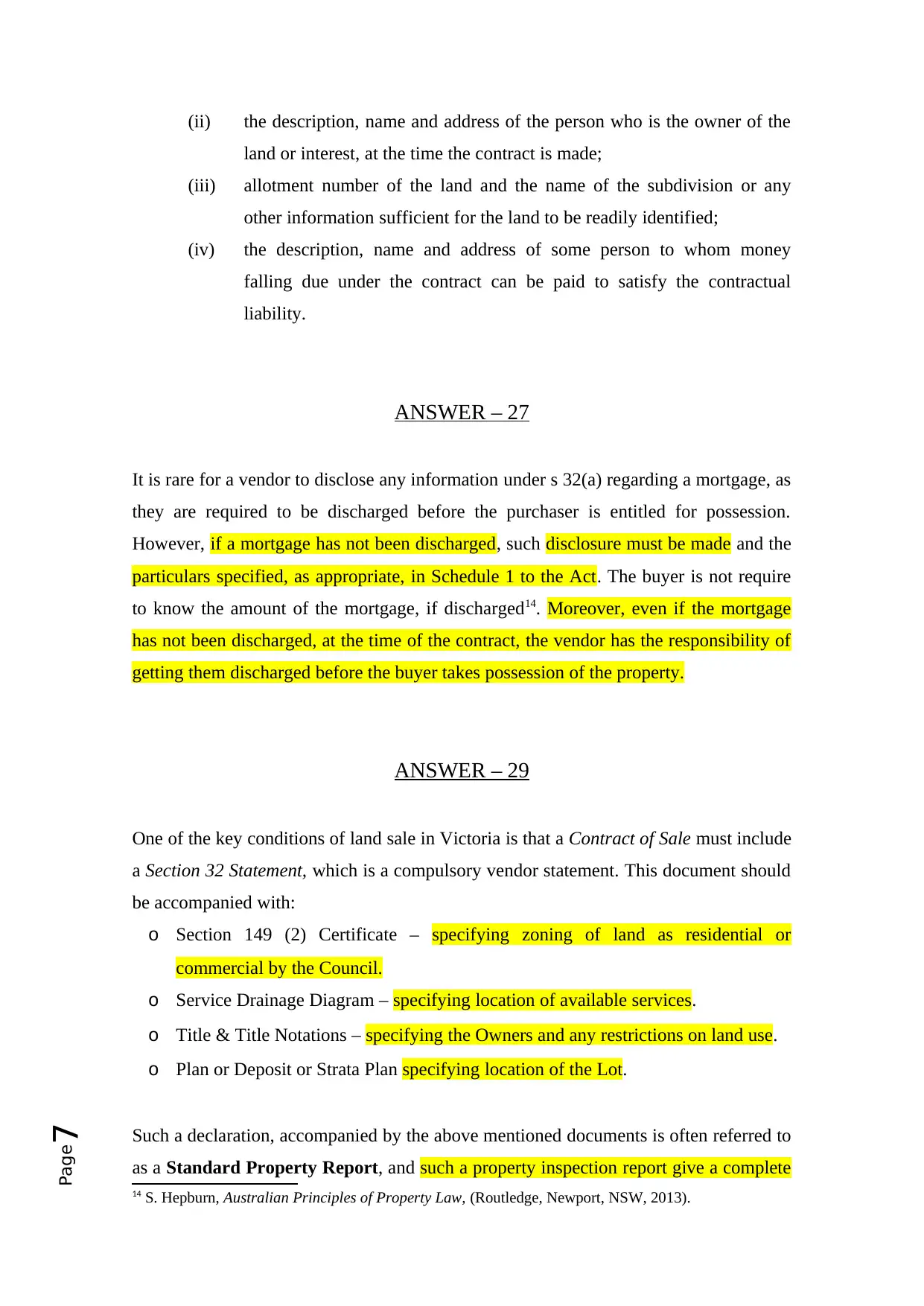
Page7
(ii) the description, name and address of the person who is the owner of the
land or interest, at the time the contract is made;
(iii) allotment number of the land and the name of the subdivision or any
other information sufficient for the land to be readily identified;
(iv) the description, name and address of some person to whom money
falling due under the contract can be paid to satisfy the contractual
liability.
ANSWER – 27
It is rare for a vendor to disclose any information under s 32(a) regarding a mortgage, as
they are required to be discharged before the purchaser is entitled for possession.
However, if a mortgage has not been discharged, such disclosure must be made and the
particulars specified, as appropriate, in Schedule 1 to the Act. The buyer is not require
to know the amount of the mortgage, if discharged14. Moreover, even if the mortgage
has not been discharged, at the time of the contract, the vendor has the responsibility of
getting them discharged before the buyer takes possession of the property.
ANSWER – 29
One of the key conditions of land sale in Victoria is that a Contract of Sale must include
a Section 32 Statement, which is a compulsory vendor statement. This document should
be accompanied with:
o Section 149 (2) Certificate – specifying zoning of land as residential or
commercial by the Council.
o Service Drainage Diagram – specifying location of available services.
o Title & Title Notations – specifying the Owners and any restrictions on land use.
o Plan or Deposit or Strata Plan specifying location of the Lot.
Such a declaration, accompanied by the above mentioned documents is often referred to
as a Standard Property Report, and such a property inspection report give a complete
14 S. Hepburn, Australian Principles of Property Law, (Routledge, Newport, NSW, 2013).
(ii) the description, name and address of the person who is the owner of the
land or interest, at the time the contract is made;
(iii) allotment number of the land and the name of the subdivision or any
other information sufficient for the land to be readily identified;
(iv) the description, name and address of some person to whom money
falling due under the contract can be paid to satisfy the contractual
liability.
ANSWER – 27
It is rare for a vendor to disclose any information under s 32(a) regarding a mortgage, as
they are required to be discharged before the purchaser is entitled for possession.
However, if a mortgage has not been discharged, such disclosure must be made and the
particulars specified, as appropriate, in Schedule 1 to the Act. The buyer is not require
to know the amount of the mortgage, if discharged14. Moreover, even if the mortgage
has not been discharged, at the time of the contract, the vendor has the responsibility of
getting them discharged before the buyer takes possession of the property.
ANSWER – 29
One of the key conditions of land sale in Victoria is that a Contract of Sale must include
a Section 32 Statement, which is a compulsory vendor statement. This document should
be accompanied with:
o Section 149 (2) Certificate – specifying zoning of land as residential or
commercial by the Council.
o Service Drainage Diagram – specifying location of available services.
o Title & Title Notations – specifying the Owners and any restrictions on land use.
o Plan or Deposit or Strata Plan specifying location of the Lot.
Such a declaration, accompanied by the above mentioned documents is often referred to
as a Standard Property Report, and such a property inspection report give a complete
14 S. Hepburn, Australian Principles of Property Law, (Routledge, Newport, NSW, 2013).
Paraphrase This Document
Need a fresh take? Get an instant paraphrase of this document with our AI Paraphraser
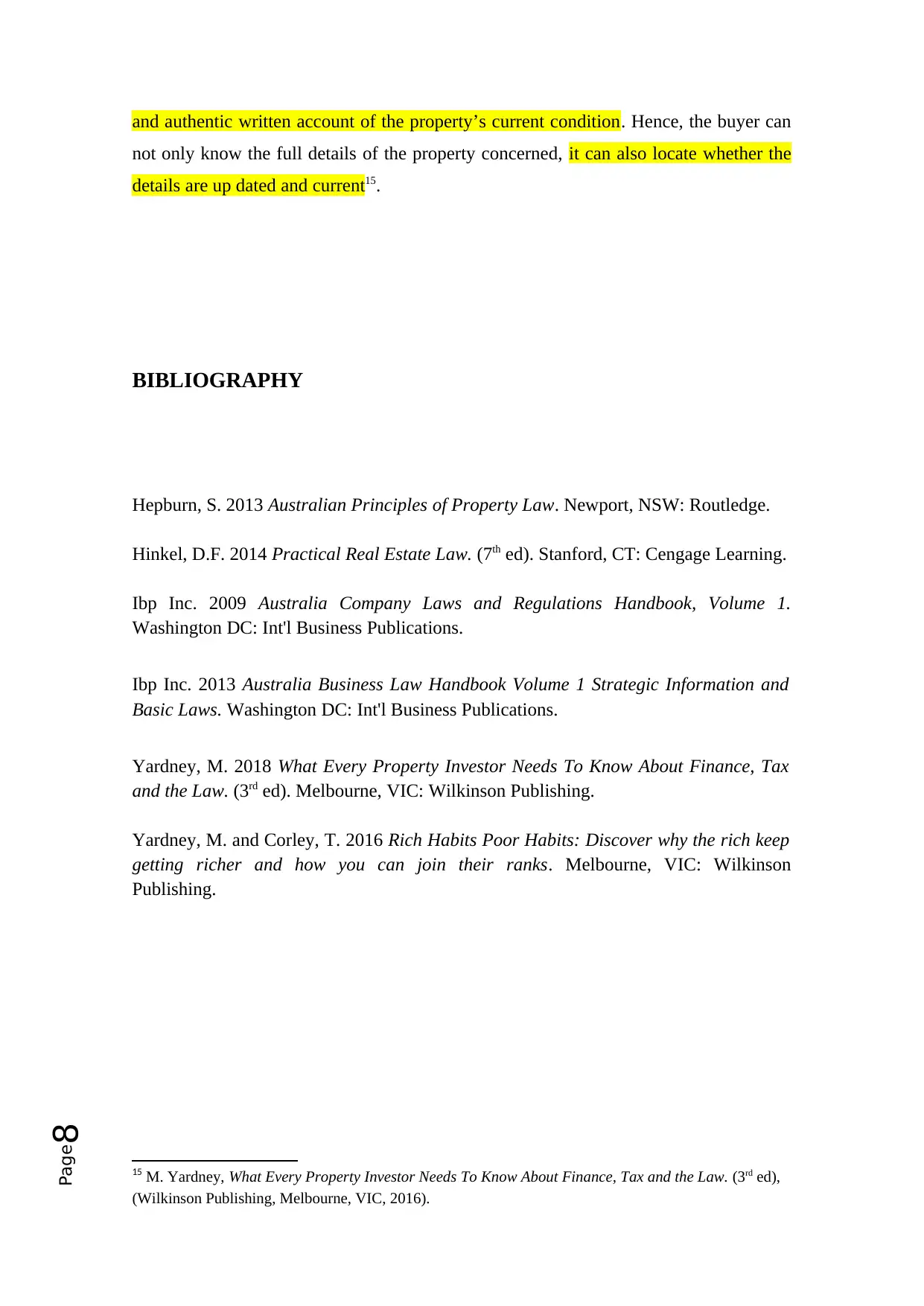
Page8
and authentic written account of the property’s current condition. Hence, the buyer can
not only know the full details of the property concerned, it can also locate whether the
details are up dated and current15.
BIBLIOGRAPHY
Hepburn, S. 2013 Australian Principles of Property Law. Newport, NSW: Routledge.
Hinkel, D.F. 2014 Practical Real Estate Law. (7th ed). Stanford, CT: Cengage Learning.
Ibp Inc. 2009 Australia Company Laws and Regulations Handbook, Volume 1.
Washington DC: Int'l Business Publications.
Ibp Inc. 2013 Australia Business Law Handbook Volume 1 Strategic Information and
Basic Laws. Washington DC: Int'l Business Publications.
Yardney, M. 2018 What Every Property Investor Needs To Know About Finance, Tax
and the Law. (3rd ed). Melbourne, VIC: Wilkinson Publishing.
Yardney, M. and Corley, T. 2016 Rich Habits Poor Habits: Discover why the rich keep
getting richer and how you can join their ranks. Melbourne, VIC: Wilkinson
Publishing.
15 M. Yardney, What Every Property Investor Needs To Know About Finance, Tax and the Law. (3rd ed),
(Wilkinson Publishing, Melbourne, VIC, 2016).
and authentic written account of the property’s current condition. Hence, the buyer can
not only know the full details of the property concerned, it can also locate whether the
details are up dated and current15.
BIBLIOGRAPHY
Hepburn, S. 2013 Australian Principles of Property Law. Newport, NSW: Routledge.
Hinkel, D.F. 2014 Practical Real Estate Law. (7th ed). Stanford, CT: Cengage Learning.
Ibp Inc. 2009 Australia Company Laws and Regulations Handbook, Volume 1.
Washington DC: Int'l Business Publications.
Ibp Inc. 2013 Australia Business Law Handbook Volume 1 Strategic Information and
Basic Laws. Washington DC: Int'l Business Publications.
Yardney, M. 2018 What Every Property Investor Needs To Know About Finance, Tax
and the Law. (3rd ed). Melbourne, VIC: Wilkinson Publishing.
Yardney, M. and Corley, T. 2016 Rich Habits Poor Habits: Discover why the rich keep
getting richer and how you can join their ranks. Melbourne, VIC: Wilkinson
Publishing.
15 M. Yardney, What Every Property Investor Needs To Know About Finance, Tax and the Law. (3rd ed),
(Wilkinson Publishing, Melbourne, VIC, 2016).
1 out of 8
Related Documents
Your All-in-One AI-Powered Toolkit for Academic Success.
+13062052269
info@desklib.com
Available 24*7 on WhatsApp / Email
![[object Object]](/_next/static/media/star-bottom.7253800d.svg)
Unlock your academic potential
Copyright © 2020–2025 A2Z Services. All Rights Reserved. Developed and managed by ZUCOL.



